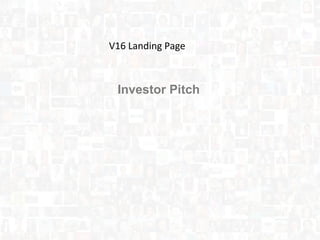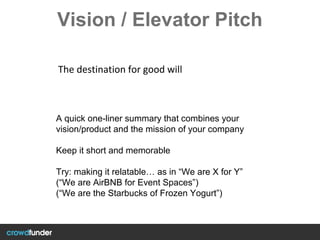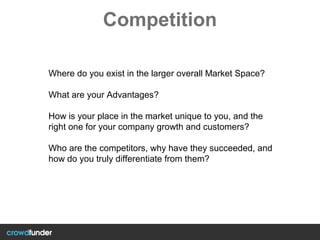Investor pitch deck template +
- 1. Investor Pitch V16 Landing Page
- 2. What Your Pitch Deck Is For… The purpose of your Investor Deck is not to answer all possible questions, nor close immediate investment. It is to open investors minds to your vision and get them excited to know more. The story you craft in your Deck gets them engaged to start filling in the blanks for themselves You want to give enough information to grab their interest, but not too much as to overwhelm them or have your story lose clarity & focus. Give them enough to get excited about, but leave them wanting more. Your Deck should be able to stand on its own, without your presentation. Compelling Decks are concise, tell a story, are visual, 10-13 slides.
- 3. Common Deck Mistakes Too many slides, too much information “Wordy slides”: To avoid, follow Guy Kawasaki’s 10/20/30 Rule of Power Point for slide design. 10 slides / 20 minutes to present the slides / 30 point font or greater Too many product details, or too many financial details Belittling competitors False/silly assumptions you can’t back up or don’t have data on False confidence or arrogance
- 4. About Crowdfunder • We connect entrepreneurs & investors: equity crowdfunding • Entrepreneurs raise investment online by using our simple fundraising service that helps them pitch, attract, close investors • We have an active investor network of thousands of investors, angels, VCs. They invest as little as $1,000, up to 6 to 7 figures • Experienced investors and VCs bring us the companies they invest in and get follow-on capital from our investor network • Our network has invested in multiple verticals: Startups, Social Enterprises, Entertainment, and Real Estate
- 5. Investor Pitch Deck Outline 1) Elevator Pitch 2) Momentum, Traction, Expertise: Your key numbers 3) Market Opportunity: Define market size & your customer base 4) Problem & Current Solutions: What need do you fill? Other solutions 5) Product or Service: Your solution 6) Business Model: Key Revenue Streams 7) Market Approach & Strategy: How you grow your business 8) Team & Key Stakeholders (Investors, Advisors) 9) Financials 10) Competition 11) Investment: Your ‘Ask’ for funding, Basic use of funds Optional Slides: Exit Strategy, Partnership Agreements, Product/Service Demo, Existing Sales/Clients, Your “Special Sauce”
- 6. Vision / Elevator Pitch A quick one-liner summary that combines your vision/product and the mission of your company Keep it short and memorable Try: making it relatable… as in “We are X for Y” (“We are AirBNB for Event Spaces”) (“We are the Starbucks of Frozen Yogurt”) The destination for good will
- 7. Traction Show your timeline and milestones to date Growth metrics are key at early stage Highlight press, partnerships, accolades Customer success stories and/or testimonials 1993 saw first computer network and Foresore global communication 1994 Songs and solutions 1996 Plot formular for stories 1996-2016 primary focus and research Towards innovation and marketing to Achieve purpose 1986 -1993 – Total clarity of purpose
- 8. Market Opportunity Define Your Market: What business/space you are in Total Market Size: Dollar Size, Your Place/Niche Customers: Clearly define exactly who you serve Macro Trends & Insights
- 9. The Problem Define the real problem/need you’re solving, and for who. Who else is already doing this, and how are they going about it and what are they not getting right or doing wrong? Current Solutions
- 10. Product / Service Tell the story of your customer and how customers use/value your product or service Images and visuals are better than lots of text: show don’t tell
- 11. Revenue Model Who is your primary customer & how do you make money What is the pricing / model Revenue and # of customers to date Show basic math on revenues and conversion rates Life-time value of an average Customer (How many months, how many dollars?)
- 12. Marketing & Growth Strategy Where are your customers looking today and finding help? Where will you get in front of them? How will you achieve your target growth rates? What are the most important and unique channels and methods you will use to find and win customers? How are you doing it differently than others in the space?
- 13. Team Highlight key team members and their prior positions, successes, domain expertise Demonstrate relevant experience Which roles are the keys to success in your company/space?
- 14. Financials Include 3-5 years of financial projections Mention key & critical assumptions in your model of expenses, customer conversion, market penetration % Highlight each of these Yearly for at least 3 years: •Total Customers •Total Revenue •Total Expense •EBITDA
- 15. Competition Where do you exist in the larger overall Market Space? What are your Advantages? How is your place in the market unique to you, and the right one for your company growth and customers? Who are the competitors, why have they succeeded, and how do you truly differentiate from them?
- 16. Investment State how much Capital you are raising, and with what general Terms: Equity, Debt, Convertible Note What is the timing of your Capital raise? Who are your existing & notable investors, if any? What are your key Use of Proceeds (as % of total raise) •Founder salaries •Sales & Marketing •New hires •Technology / Product or Service development •Capital expenses / equipment
- 17. Thanks & Attribution This deck/formula was distilled from a variety of sources: •Crowdfunder Co-Founders & Investors •500 Startups / Dave McClure •Sky Fernandes •Reid Hoffman of LinkedIn & Greylock •Amplify LA •TechStars •Decks uploaded to Crowdfunder by Founders who raised significant investment rounds With a simple search on the web for their names and ‘pitch deck’ you will find pitch resources they published
















